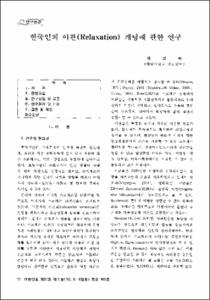한국인의 이완(Relaxation) 개념에 관한 연구
- Keimyung Author(s)
- Park, Jeong Sook
- Department
- Dept. of Nursing (간호학)
- Journal Title
- 대한간호
- Issued Date
- 1992
- Volume
- 31
- Issue
- 2
- Abstract
- Relaxation technique is an independent nursing intervention used in various stressful situations. The concept of relaxation must be explored for the meaning given by the people in their traditional thought and philosophy. Korean relaxation technique, wanting to become culturally acceptable and effective, is learning to recognize and develop Korean concepts, experiences, and musics of relaxation. This study was aimed at discovering Korean concepts, experiences and musics of relaxation and contributing the development of the relaxation technique for Korean people. The subjects were 59 mursing students, 39 hospitalized patients, 61 housewives, 21 rural residents and 16 researchers. Data were collected from September 4th to October 24th, 1991 by interviews or questionaires. The data analysis was done by qualitative research method, and validity assured by conformation of the concept and category by 2nursing scientists who had written a Master's thesis on the relaxation technique. The results of the study were summerized as follows; 1. The meaning of the relaxation concept; From 298 statements, 107 concepts were extracted and then 5 categories "Physical domain", "Psychological domain", "Complex domain", "Situation", and "environment" were organized. 'Don't have discomforts, 'don't have muscle tension', 'don't have energy(him in Korean)', 'don't have activities' subcategories were included in "Physical domain". 'Don't have anxiey', 'feel good', 'emotional stability', 'don't have wordly thoughts', 'feel one's brain muddled', 'loss of desire' subcategories were included in "physical domain" 'Comfort body and mind', 'don't have tension of body and mind', 'be sagged' 'liveliness of thoughts' subcategories were included in "Complex domain". 'Rest', 'sleep', 'others' subcategories were included in "Situation domain". And 'quite environment' & 'comfortable environment' subcategories were included in "Environmental domain". 2. The experiences of the relaxation; From 151 statements, 59 experiences were extracted. And then 9 categories-at rest after physical activities, after problem solving, fancy, bathing in the bed, situation, rest, particular time, others-were organized. 3. The musics of the relaxation; From 229 statements, 108 musics were extracted. and the 9 categories- Western classical music, semi classical music, Korean song, Korean popular classical music, song, western popular sonhg, hymn, characteristics of music, others - were organized. In conclusion, There are some differences between Korean concepts, experiences and musics of relasation and western concepts, experiences and musics of relaxation.
- Alternative Title
- A Study on Korean Concepts of Relaxation
- Keimyung Author(s)(Kor)
- 박정숙
- Publisher
- College of Nursing
- Citation
- 박정숙. (1992). 한국인의 이완(Relaxation) 개념에 관한 연구. 대한간호, 31(2), 70–85.
- Type
- Article
- ISSN
- 0047-3618
- Appears in Collections:
- 2. College of Nursing (간호대학) > Dept. of Nursing (간호학)
- 파일 목록
-
-
Download
 oak-bbb-00304.pdf
기타 데이터 / 745.31 kB / Adobe PDF
oak-bbb-00304.pdf
기타 데이터 / 745.31 kB / Adobe PDF
-
Items in Repository are protected by copyright, with all rights reserved, unless otherwise indicated.